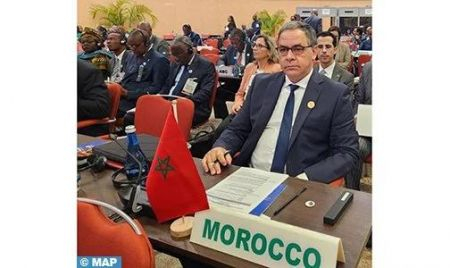AU: Morocco Highlights Inter-African Cooperation in Kigali for Successful Implementation of Agenda 2063’s 2nd Ten-Year Plan
Morocco emphasized the importance of inter-African cooperation for the successful implementation of the pan-African institution’s 2nd Ten-Year Plan of the Agenda, at the African Union’s (AU) Ministerial Retreat on Agenda 2063, held in Kigali from October 1 to 03. “It is important to underline the significance of inter-African cooperation in building the capacities of member states for the successful implementation of the 2nd Ten-Year Plan of the AU’s Agenda 2063,” stressed the Kingdom’s Ambassador and Permanent Representative to the AU and the United Nations Economic Commission for Africa (UNECA), Mohamed Arrouchi, who was speaking at the Ministerial Retreat. The Moroccan diplomat also highlighted that coordination is crucial for the effective implementation of Agenda 2063 and its ten-year plans. “There is a lack of coordination between the AU bodies responsible for implementing Agenda 2063 and the Regional Economic Communities (RECs), as well as between the RECs and member states,” noted Arrouchi, adding that this weak coordination has led to significant delays in domesticating the first ten-year plan of Agenda 2063 at the national level and consequently in aligning it with national development plans. The involvement of the RECs in the process of implementing Agenda 2063 and the sharing of experiences and best practices are essential for the successful implementation of the next ten-year plan, insisted the Moroccan diplomat. Arrouchi, who led the Moroccan delegation at the Ministerial Retreat, added that defining roles clearly among the various stakeholders would also help achieve the objectives of Agenda 2063. The aim of the three-day Ministerial Retreat is to hold discussions and seek strategic guidance on the results of the Agenda 2063 Special Project, focusing on the evaluation of the First Ten-Year Plan and the formulation of the Second Ten-Year Plan for the implementation of Agenda 2063, as well as on the classification of flagship projects and financing issues.

